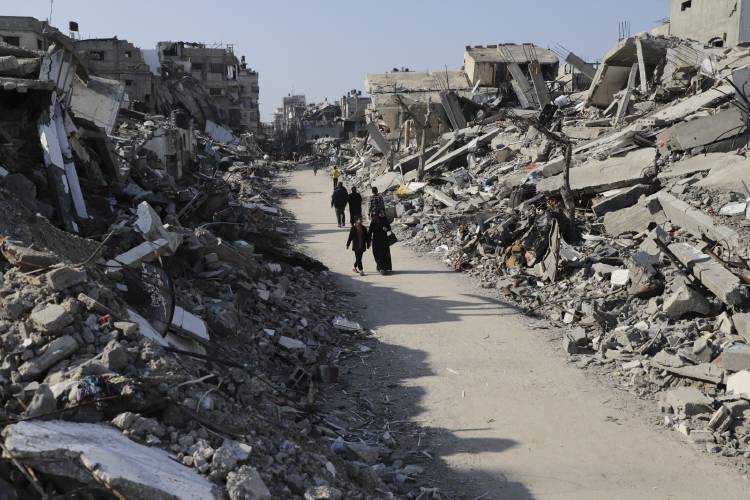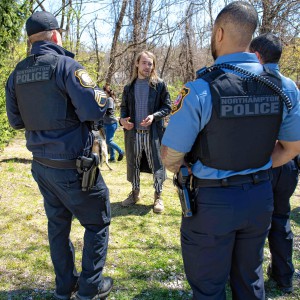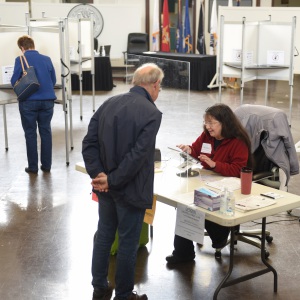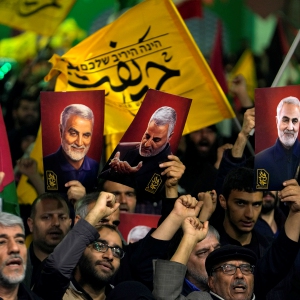Guest columnist Daniel Czitrom: Beyond the Mideast binary

Palestinians walk through the destruction from the Israeli offensive in Jabaliya refugee camp in the Gaza Strip on Feb. 29. AP PHOTO/MAHMOUD ESSA
| Published: 03-06-2024 6:11 PM |
As an active member of Jewish Voice for Peace, I have been energized and heartened by the recent local protests calling for a cease-fire in Gaza, a negotiated settlement to the hostage crisis, and justice for the Palestinian people. I’ve seen a large number of concerned and committed people at the Northampton roundabout and City Hall “die-in” demonstrations, reflecting the growing opposition here and around the world to U.S. policy in the Mideast.
Yet despite the occasional criticisms of Benjamin Netanyahu’s leadership voiced by President Joe Biden and other administration figures, America continues its massive military aid to Israel, enabling the unconscionable slaughter of tens of thousands of innocent Palestinian civilians.
Ever since the appalling and reprehensible Oct. 7 attack by Hamas — one that massacred innocent civilians — American news media outlets and political figures have framed the conflict largely as a narrow binary choice. Either one “stands with Israel” or supports “the resistance,” no matter the excesses and brutality on either side. Of course, opposition to the Netanyahu government’s policies is widespread and growing more vocal in Israel itself.
In fact, compared to the political correctness that constricts the range of permissible views in American political life, Israelis enjoy a much wider range of criticism and open debate about Mideast policy than we do.
Fierce arguments about the meaning and goals of Zionism have divided Jews since the 1890s, and they still do. But with the rise to power of the Likud party and its ultra-Orthodox right-wing allies, along with the relentless growth of Israeli settlements on the West Bank (supported by American aid and now nearing 500,000 settlers), the prospects for a just peace that would include a Palestinian state seem further away than ever.
A large fraction of American Jews, including myself, have long opposed both the expansion of West Bank settlements and the Israeli right’s refusal to recognize the legitimate political aspirations of Palestinians. Yet we are outspent, out-lobbied, and out-influenced by groups including the American Israeli Political Action Committee (AIPAC) and the Anti-Defamation League (ADL), which too often equate any criticism of the Israeli government with antisemitism.
What about the Palestinian side? I’ve been surprised and disappointed at how little many of my fellow protesters know about the diversity of Palestinian politics. Those of us who reject the Islamist vision of Hamas, including its desire to impose Sharia law, need to learn more about and support alternative Palestinian voices.
The most important and popular of these is Marwan Barghouti, who since 2002 has been serving five life sentences in Israeli prisons for his role in the Second Intifada. Before that, Barghouti rose to a leadership position in the Fatah party. Every poll since his imprisonment shows him to be the favorite to lead the Palestinian people in a free election.
Article continues after...
Yesterday's Most Read Articles
 Police report details grisly crime scene in Greenfield
Police report details grisly crime scene in Greenfield
 Super defers Amherst middle school principal pick to successor; one finalist says decision is retaliation for lawsuit
Super defers Amherst middle school principal pick to successor; one finalist says decision is retaliation for lawsuit
 Homeless camp in Northampton ordered to disperse
Homeless camp in Northampton ordered to disperse
 Authorities ID victim in Greenfield slaying
Authorities ID victim in Greenfield slaying
 Haydenville residents resist Greenway trail plan, float alternative design
Haydenville residents resist Greenway trail plan, float alternative design
 Locking up carbon for good: Easthampton inventor’s CO2 removal system turns biomass into biochar
Locking up carbon for good: Easthampton inventor’s CO2 removal system turns biomass into biochar
His wife, the feminist activist and lawyer Fadwa Barghouti, also a Fatah leader, has worked tirelessly to advocate globally for his release and keep him in the public eye. Barghouti has renounced violence and his 2006 “Prisoners’ Letter,” written on behalf of Fatah, Hamas, and other Palestinian factions inside Israeli prisons, offered an outline for a two-state solution.
By contrast, the Israeli right has done everything in its power to subvert the 1993 Oslo Accords since they were signed, including the cynical funding of Hamas as a way to weaken Fatah and the Palestinian Authority,
Recently, Ami Ayalon, the former head of Shin Bet, Israel’s domestic security service, called for the release of Barghouti as a vital step toward meaningful negotiations. “We Israelis will have security only when they, Palestinians, will have hope. This is the equation,” he told The Guardian newspaper.
Some have compared Barghouti to Nelson Mandela, who also spent decades in jail, was dismissed as a terrorist by the U.S. government, and renounced armed struggle in favor of a political solution to ending apartheid.
The larger point is for us to educate ourselves beyond the simplistic binary of Israel vs. Hamas, or the belief that right-wing Zionism offers the only bulwark against “terrorism.” We need to press our government to make creation of an independent, democratic Palestinian state an urgent U.S. foreign policy goal. Until then, see you at the next demo.
Daniel Czitrom is professor emeritus of history on the Ford Foundation at Mount Holyoke College. He lives in South Hadley and can be reached at dczitrom@mtholyoke.edu.

 Charlene Galenski: Blake Gilmore, a strong candidate for Deerfield’s Selectboard
Charlene Galenski: Blake Gilmore, a strong candidate for Deerfield’s Selectboard Annette Pfannebecker: Vote yes for Shores Ness and for Deerfield
Annette Pfannebecker: Vote yes for Shores Ness and for Deerfield Columnist Susan Wozniak: Rising costs long ago swamped hippie ideal
Columnist Susan Wozniak: Rising costs long ago swamped hippie ideal Guest columnist Rudy Perkins: Dangerous resolution pins ‘aggression’ on Iran
Guest columnist Rudy Perkins: Dangerous resolution pins ‘aggression’ on Iran
